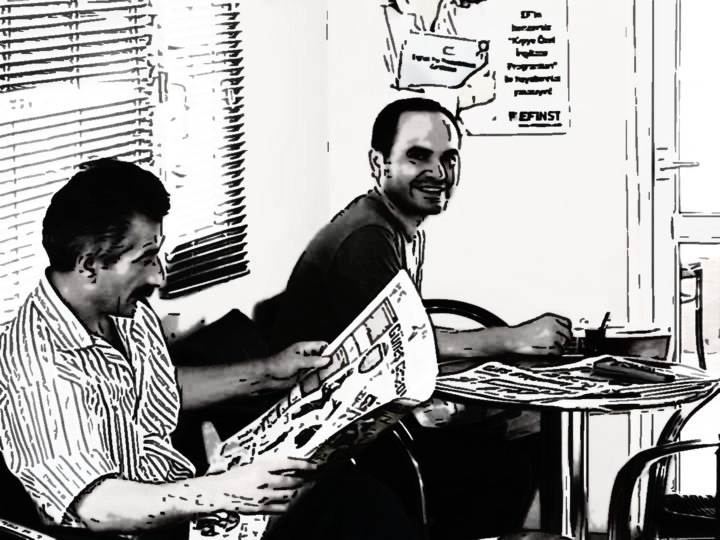We all have those people who drift in and out of our lives, and years later, we find ourselves musing about them, wondering whatever became of them.
For some reason, I got to thinking about Angry Çetin the other morning. “Kızgın Çetin,” as we called him in Turkish. We called him that sometimes fondly, most of the time fearfully.
Çetin was a custodian at our school in Suadiye, a well-off neighborhood on the Asian side of the city. The school was located on Bağdat Caddesi, named so because in the old days it was said to run all the way to Baghdad. Nowadays it’s a fashionable shopping street, and our school catered to housewives, their children as well as their businessmen husbands.

Çetin was responsible for keeping the classrooms and offices looking spic and span. After each lesson, he’d go in, armed with a broom or mop. He’d give the floor a quick, jerky brush and swab, rearrange the desks, erase any scrawlings an absent-minded teacher might have left on the whiteboard, open the windows to let in the warm, sea air from the nearby Marmara.
As far as his appearance, Çetin was just as fastidious; his short-sleeved shirts were always ironed, and his salt-and-pepper mustache carefully trimmed and groomed. He was one of those whose age was difficult to determine. While his hair was also salt-and-pepper, and we knew he had a son (who attended the lessons at the school), Çetin had a short, wiry build that seemed always coiled with the energy and spring of a tabby cat. He was never entirely relaxed, always ready to grab an unsuspecting chair that had drifted out of place, or to wipe down a guilty-looking surface that had been caught fraternizing with a speck of dust.
He was “very particular,” as our director frequently reminded us, and because he didn’t speak English and few of the foreign teachers spoke much Turkish, he often communicated with a series of abrupt, curt gestures. Those of us who had worked at the school for awhile grew accustomed to his sudden outbursts, such as if you were caught putting paper into the plastic bin.
The newly arrived teachers, be they from the U.K., Australia or Stateside, would appear startled, even traumatized. They’d come into the teacher’s room looking noticeably shaken, having been not so formally introduced to Angry Çetin.
Çetin was from somewhere in the Black Sea region. Like most men from that region (as a student Ufuk, a woman also from that famous region told me), Çetin had a nervous temperament, and talked very rapidly and loudly. I say most men because upstairs in the cantina, Fetih was the complete opposite. He came from the Black Sea town of Trabzon, and had the mildest, easy-going temperament you could ever hope for. It was Fetih who usually gave the teachers the rundown on Angry Çetin. If Çetin yelled at us about something, Fetih would smile and wink bemusedly, shrugging his shoulders to remind us not to take it too personally. Çetin was an equal opportunity abuser, after all, and he was not really an abuser, he was just wired a certain way: He didn’t deal with people; people dealt with him.
In the four (five?) years we worked together, I can recall Angry Çetin relaxing (or approximating it) only on a few stray mornings, when he would sit upstairs in the cantina with Fetih and Galep, another custodian who also hailed from the Black Sea, and the three of them would sit reading the newspaper and listening to the roundup of football matches on the TV. Fetih made a mean toasted sandwich, and often gave them to the newly arrived teachers or the cash-poor on credit, and though some complained his Turkish tea was often a tad bitter, it was nonetheless served in plentiful quantities. The sandwich and bitter tea was usually Angry Çetin’s mid-morning repast, before he had to go and clean the classrooms when the morning lessons ended.
Along with his custodial duties, Çetin also served as the guide and handler for the foreign teachers when we had to go to the Foreign Police office to get residency and work permits. This grim and desultory trip was always dreaded by the teachers, for the office in Fatih was nearly always crowded, stuffed with the usual overworked bureaucrats and their byzantine procedures, not to mention all the other foreigners lined up or milling about anxiously awaiting their permits.
On these trips, having Çetin along was a godsend. “Gel! Gel!” he cried, grabbing the clueless teacher by the elbow and steering you through the crowds, down strange corridors and up groaning staircases. He’d muscle people out of the way, occasionally barking in his fast Black Sea way, and you’d think, “Yeah, get ‘em, Çetin!” It was always rather satisfying to watch while other people fell under Angry Çetin’s assault, to view his peculiar blend of gruff Black Sea charm from a safe distance.
It didn’t always work. One morning I went with him to renew my papers. The offices were jammed with lots of Syrian refugees, and the usual assortment of other anxious people. Çetin all but jerked me over to an available desk. I stood mutely, like some Ellis Island immigrant in “The Godfather,” while Çetin handed the clerk my papers.
Suddenly a rapid dialogue erupted between them. Evidently there was something wrong with my papers. Angry Çetın came out of his shell, his voice taking on the harsh elements we at the school knew so well, like when we walked on his freshly mopped floor. I silently rooted for him to conquer this pesky weasel of a clerk. Çetin, battled on, entreating, employing subtly phrased logic, wiping his brow.
In the end, Çetin threw up his hands and stifled a curse. The clerk handed back my papers, with an accompanying note.
Score one for the bureaucrat. I (and a Very Angry Çetin) had to go back the following week. Later as we sat on the ferry heading back to Kadikoy, Çetin just dozed, as the boat rocked back and forth and the sea gulls swooped by over the choppy grey waves.
Fortunately everything worked out, and my papers were soon in order.
Over the next few years, the school began to decline, for a lot of reasons. Anyway, one day we were told that Çetin was no longer with the school. By then Fetih had already closed the cantina upstairs and had left the school to work for a water delivery company. Galep had retired or something. The Black Sea Turks were gone.
We missed them, Fetih with his easy-going generosity and tasty sandwiches (we didn’t really miss his tea), Galep with his jokes and spontaneous dancing (he’s a story in himself, old Galep). But most of all we missed Angry Çetin, in some form of masochistic sentimentality (well, isn’t all sentimentality a form of masochism?).
For the uninitiated, things move pretty fast in Istanbul. The city can hit you from all sorts of crazy angles. Perhaps we missed him because he tried to shield us from it all, like a harsh but protective father. Or maybe I think of him because I am now a father myself. Who knows? Maybe some people will someday refer to me as Angry James? I do find myself getting a bit more particular about some things than I used to, more agitated, but maybe that’s the lockdown. I wonder how old Angry Çetin is dealing with this whole pandemic thing. Something tells me that, wherever he is, he’s doing just fine. I just feel bad for that poor bastard who steps too close to him in the supermarket, or who refuses to wear a mask.
James Tressler, a former Lost Coast resident, is a writer and teacher living in Istanbul.










Such a enjoyable ‘read’ James – I can picture ‘Kizgin Çetin’ perfectly! Thankyou for filling five minutes of yet another lock-down day with pleasure.